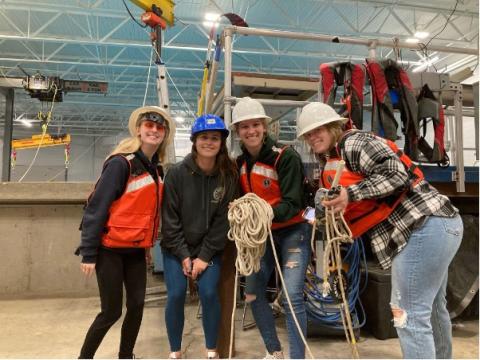Research Opportunities for Undergrads at UNH
Do you want to attend a school where you can get involved in research projects right away as an undergraduate? Do you want to take on projects that mean you'll journey on a boat on the Atlantic Ocean, perform dance before a crowd or identify artifacts in Greece?
UNH is the place where undergraduates of all majors find it easy and exciting to work on research projects, starting in their first year.
This Q & A will answer all the questions you have about getting involved with research at UNH as an undergraduate, while spotlighting some of our current students who are undergraduate researchers.
What is an R1 Research University?
UNH has the R1 Carnegie Classification: the highest possible category for university research held by some of the most prestigious universities in the country.
Meet an undergrad researcher: Isabella, Wildlife & Conservation Biology
"Being able to see that my efforts as an individual could cascade to a bigger picture overall from a conservation standpoint was really awesome."
Is it easy for undergraduates to find research opportunities at UNH?
It’s simple to get involved in research at UNH as an undergrad! Two out of every three professors mentor undergraduates on research and more than 2,000 students participate in our annual undergraduate research conference.

Meet an undergrad researcher: Violet, Exercise Science
"For my senior project, I wrote a manuscript that we're going to be submitting to be published to a peer-reviewed journal and I'm first author which is something that I never imagined would happen."
What is the impact of UNH student research?
UNH has partnerships with public sector giants like NASA and NOAA. As a student, you’ll have the opportunity to influence real-world change, from the campus to the local community and the world.

Meet an undergrad researcher: Franny, Marine, Estuarine & Freshwater Biology
"With access to the Shoals Marine Lab, the UNH pier and Coastal Marine Lab, the facilities at the Chase Ocean Engineering Lab and the Jackson Estuarine Lab, UNH is the perfect place to study anything related to our oceans, estuaries or coasts."
Where does research take place at UNH?
UNH has a variety of state-of the-art research facilities, including the Hubbard Center for Genome Studies, where professors and students collaborate on human health research, and our Chase Ocean Engineering Lab, where students test underwater robots in a wave tank. Students also research off campus, from boats on the Atlantic Ocean to the local Seacoast community, and to study abroad locations across the globe.

Meet an undergrad researcher: Natalie, Ocean Engineering
"I’ve spent countless hours in the Jere A. Chase Ocean Engineering Laboratory working on various labs, projects, coursework and more…Being able to work with these facilities as an undergrad has been significant in enriching my educational experience with real-world and hands-on experience."
Do UNH students get paid for their research?
Yes. There are funded summer research opportunities, including Summer Undergraduate Research Fellowships (SURF) and students can find opportunities to work in research labs like they would any other part-time campus job.
Meet an undergrad researcher: Emma, Bioengineering
"UNH did a great job preparing me for my plans after graduation. I was able to get hands-on experience starting my freshman year with the Innovation Scholars program."
What is the benefit to getting involved with research on campus?
Undergraduates at UNH form meaningful relationships with professors and graduate students through research labs, sometimes working in the same lab for all four years. Students graduate as co-authors on major research articles, earn admission to some of the nation’s top graduate programs and present at national conferences. Along the way they learn major skills, from interviewing research subjects to investigating primary sources.
related posts:

What Does it Mean to be a Research University?
Every day at UNH, our faculty and students are working on problems that matter, like building instruments for NASA, or understanding the impact of Pre-K programs on equity in education. That's because UNH is an R1 research university. But, what exactly does R1 mean? And, how can you get involved in research as a UNH student? Read on to find out. read more about research